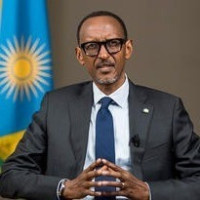Kagame began his primary education in a school near the refugee camp, where he and other Rwandan refugees learned how to speak English and began to integrate into Ugandan culture. At the age of nine, he moved to the respected Rwengoro Primary School, around 16 kilometres (10 mi) away. He subsequently attended Ntare School, one of the best schools in Uganda, which was also the alma mater of future Ugandan President Yoweri Museveni. According to Kagame, the death of his father in the early-1970s, and the departure of Rwigyema to an unknown location, led to a decline in his academic performance and an increased tendency to fight those who belittled the Rwandan population. He was eventually suspended from Ntare and completed his studies at Old Kampala Secondary School.
After completing his education, Kagame made two visits to Rwanda, in 1977 and 1978. He was initially hosted by family members of his former classmates, but upon arrival in Kigali; he made contact with members of his own family. He kept a low profile on these visits, believing that his status as a well-connected Tutsi exile could lead to arrest. On his second visit, he entered the country through Zaire rather than Uganda to avoid suspicion. Kagame used his time in Rwanda to explore the country, familiarise himself with the political and social situation, and make connections that would prove useful to him in his later activities.
Most observers describe Kagame's personality as one of seriousness and intelligence. Richard Grant, writing in London's Daily Telegraph, described Kagame as radiating "a quality of intense seriousness that is both impressive and intimidating". Roméo Dallaire, commander of the United Nations Assistance Mission for Rwanda during the Rwandan genocide, described Kagame as having a "studious air that didn't quite disguise his hawk-like intensity". Kagame has a highly dominant personality, which he uses to enforce his rule and to ensure that his vision for the country is followed. American journalist Stephen Kinzer, who wrote the biography A Thousand Hills in collaboration with Kagame himself, describes him as "one of the most intriguing leaders in Africa". Kinzer credits Kagame with leadership skills that have fostered Rwanda\'s rebirth following the genocide, but also cites a personality of "chronic impatience, barely suppressed anger, and impulsive scorn for critics". In his interview with Grant, Kagame claimed he sleeps for only four hours per night, devoting the remainder of his day to work, exercise, family, and reading academic texts and foreign newspapers.
In Rwanda, Kagame's RPF is seen as a Tutsi-dominated party, and in the years following the 1994 genocide, it was deeply unpopular with the Hutu, who constitute 85% of the population. Approximately two million Hutu lived as refugees in neighboring countries until 1996, when Kagame forced them to return home. Many Hutu also supported the late 1990s cross-border insurgency against Kagame by defeated forces of the former regime. By 1999, when the RPF had weakened the insurgents and the northwest became peaceful, the Hutu population became broadly supportive of Kagame. Since becoming president in 2000, Kagame has won three disputed presidential elections with over 90% of the vote each time. Despite criticisms over opposition repression during these elections, and accusations that the figures were inflated, Kagame does receive genuine support from the population, who credit him with ensuring continued peace, stability, and economic growth.
Kagame's image amongst international observers is varied. Human rights organizations, including Amnesty International and Freedom House, claim that Kagame hamstrings his opposition by restricting candidacies in elections to government-friendly parties, suppressing demonstrations, and arresting opposition leaders and journalists. Human Rights Watch and Freedom House have accused Kagame of using strict laws criminalizing "divisionism" (ethnic hatred) and genocide ideology to silence his critics, to the point that Rwanda is a de facto one-party state. It has praised some aspects of Kagame's rule, such as the progress made in the delivery of justice and the abolition of the death penalty. Other progressive initiatives include supporting a UN declaration on LGBT rights, as well as the world's highest representation of women in parliament. Kagame's image amongst foreign leaders was very positive until the late 2000s. He was credited with ending the genocide, bringing peace and security to Rwanda, and achieving development. Since 2010, the international community has increasingly criticized Kagame following a leaked United Nations report alleging Rwanda\'s support for the rebel M23 movement in Congo. In 2012, the United Kingdom, Germany, the Netherlands and several other countries suspended programmes of budget support to Rwanda, with many redirecting their aid to project-based assistance.
Kagame promotes the Internet as a means of communication between leadership and ordinary people. In addition to his personal website, which contains a personal blog, he has accounts on Flickr, YouTube, Facebook and Twitter. In 2011, he argued with British journalist Ian Birrell on Twitter following a tweet by Birrell about media freedom in Rwanda. Human rights organizations have accused Kagame's government of linking any criticism with genocide denial.

